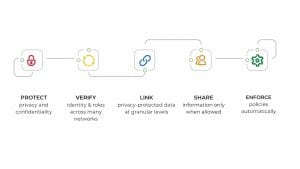
The EP3 Foundation’s Marsali Hancock reflects on the forward-thinking innovations that are necessary to deliver comprehensive health information interoperability.
To date, no health system has been able to overcome the obstacles and challenges to cross-border, comprehensive health information interoperability. Despite enormous investments and advances in technology, the health industry is still unable to consistently identify patients; give them access to their information; analyse and measure trends, risks, outcomes and costs; or agree on common standards to safely send, receive and manage data across different records systems.
When we have so much to gain by working together to reduce illness and improve health outcomes, why are healthcare providers, practitioners, academics and health research institutions still unable to access, aggregate and share health information?
The structure of the internet
The answer lies in the basic structure of the internet. It was designed in the mid-1900s, specifically to keep communication lines open when centralised networks are damaged. It was never designed to be secure or private. This means that additional protocols and architectures are required to protect privacy and share sensitive, highly regulated information.
The EP3 Foundation enables health information interoperability, implementing new data architectures and embracing innovation as the sure path to trusted data flows. To do so, we partner with the leading health and cybersecurity authorities to establish the accreditations for systems using privacy-preserving data protocols that improve transparency and accountability across the entire ecosystem.
These data protocols allow decision intelligence for people based on location, lifestyle and genome. They also enable public and population healthcare providers to detect, intervene and conduct privacy-preserving surveillance. As a result, doctors and providers of care will better co-ordinate comprehensive, integrated care, and discover new models that improve treatment and recovery outcomes.
For the first time, comprehensive real-time data is available to determine how to create healthy, sustainable communities while also respecting the rights and privacy of patients. This enables everyone to leverage privacy networks that use ‘trust blocks’ with current data systems to:
- Protect privacy and confidentiality
- Verify identity and roles across many networks
- Link privacy-protected data at granular levels
- Share information only when allowed
- Enforce policies automatically.

How it works: trusted data exchange networks
The EP3 Foundation collaborates with stakeholders and trust authorities to implement software-defined privacy domains using current technologies.
EP3 Privacy Domains transform information by binding criteria and credentials to the smallest attribute levels from everything gathered about and from an individual. This process takes everything that used to be sensitive information and transforms it into pseudonymised, obfuscated, trust blocks. Then, they can be partitioned and distributed across multiple privacy networks.
These trust blocks can also receive any aggregates, analytic outputs or resources from additional privacy networks. They can automate enforcement and verify identities across multiple participating networks. This gives you control over what information is shared, with whom, and the ability to withdraw that permission or delete it across the entire network.
For example, participating research institutions and healthcare providers, with privacy networks, provide additional resources to verify identities, roles and permissions, all without affecting patients’ privacy because everything happens within the privacy-preserving network at the attribute, trust block level.
Privacy networks also eliminate the risk of a breach because the information inside the block is now fully opaque. Even if someone unauthorised accesses the trust blocks, no data breach notifications are required, because no information was disclosed.
Contact us
We believe that forward-thinking innovations are critical to achieving interoperability and the vision of empowering every individual to use their health information to the fullest extent, allowing providers and communities to deliver smarter, safer and more efficient care.
Marsali Hancock
President & CEO
EP3 Foundation
+1 4088007202
mhancock@ep3foundation.org
https://www.ep3foundation.org/
Please note, this article will appear in issue 8 of Health Europa Quarterly, which is available to read now.
























